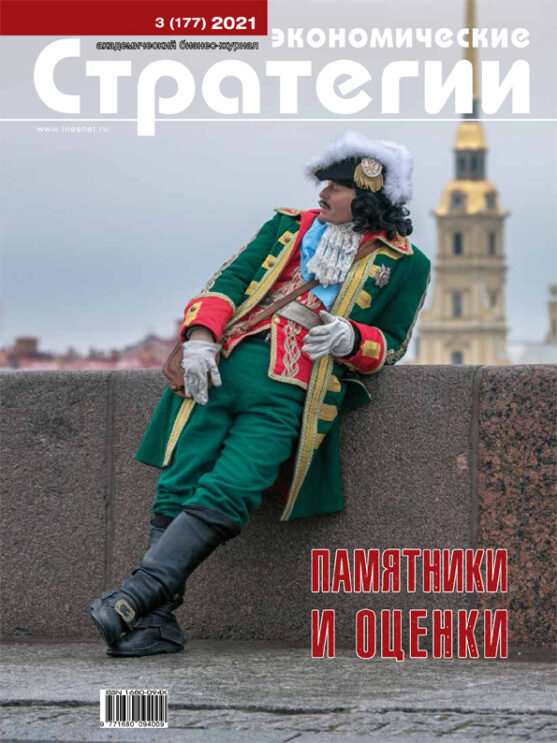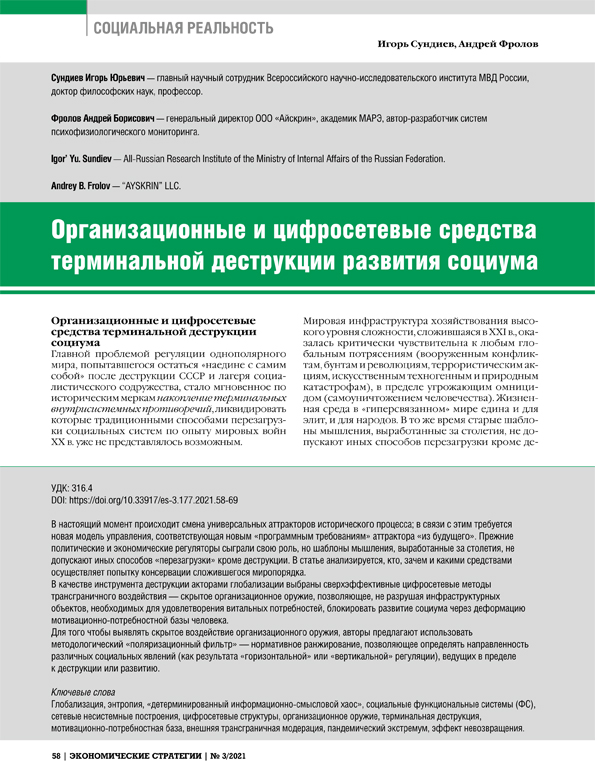Organizational and Digital Network Means of Terminal Destruction of Social Development
DOI: https://doi.org/10.33917/es-3.177.2021.58-69
At the moment, there is a change in the universal attractors of the historical process; in this regard, a new management model is required, corresponding to the new “program requirements” of the attractor “from the future”. The former political and economic regulators have fulfilled their role, but the patterns of thinking developed over the centuries do not allow for any other means of “reset” than destruction. The article analyzes who, why, and by what means attempts to preserve the existing world order. As a tool of destruction, the actors of globalization have chosen ultra-effective digital network methods of cross-border impact — a hidden organizational weapon that allows, without destroying the infrastructure facilities necessary to meet vital needs, to block the development of society through the deformation of the motivational and need base of a person.
In order to identify the hidden impact of organizational weapons, the authors propose to use a methodological “polarizing filter” — a normative ranking that allows us to determine the direction of various social phenomena as the results of “horizontal” or “vertical” regulation, leading to the limit of destruction or development.
References:
1. Sundiev I.Yu., Frolov A.B. Upravlenie superpozitsiei v informatsionno-kognitivnykh protsessakh (invariantnost’ metodov destruktsii sotsiuma) [Management of Superposition in Information-Cognitive Processes (Invariance of Methods of Destruction of Society)]. Ekonomicheskie strategii, 2019, no 7, pp. 124–133, available at: https://doi.org/10.33917/es-7.165.2019.124-133.
2. Katasonov V.Yu. Tri idei Rimskogo kluba. K 50-letiyu podvedeniya miny pod chelovechestvo [Three Ideas of the Club of Rome. To the 50th Anniversary of Placing a Bomb Under Humanity]. Fond strategicheskoi kul’tury, 2018, September, 4, available at: https://www.fondsk.ru/news/2018/09/04/tri-idei-rimskogokluba-46724.html.
3. Delyagin M. Chelovechestvo za porogom [Humanity Beyond the Threshold]. Izborskii klub, 2018, February, 5, available at: https://izborsk-club.ru/14738.
4. Kapitsa S.P. Istoriya desyati milliardov [The Story of Ten Billion]. Sait S.P. Kurdyumova “Sinergetika”, available at: http://spkurdyumov.ru/biology/istoriyadesyati-milliardov/
5. Sudakov K.V. Golograficheskii printsip sistemnoi organizatsii zhiznedeyatel’nosti [Holographic Principle of the Systemic Organization of Life Activity]. V kn.: Izbrannye trudy [Selected Works]. Vol. 1 Razvitie teorii funktsional’nykh system [Development of the Functional Systems Theory]. Moscow, GU NII normal’noi fiziologii im. P.K. Anokhina RAMN, 2007, pp. 174–218.
6. Interv’yu S.P. Kurdyumova i G.G. Malinetskogo o regulyatsii slozhnykh sistem: Programma “Gordon”: “Sinergetika” [Interview with S.P. Kurdyumov and G.G. Malinetskiy on the Complex Systems Regulation: “Gordon” Program: “Synergetics”]. YouTube, 2013, April, 7, available at: https:// youtu.be/DueTp7idhUo.
7. Nasonov A.N., Tsvetkov I.V., Zhogin I.M., et al. Fraktaly v naukakh o Zemle [Fractals in Earth Sciences]. Ucheb. posobie. Voronezh, 2018, 82 p.
8. Malinetskii G.G., Potapov A.B. Dzhokery, rusla ili poiski tret’ei paradigmy [Jokers, Channel or Searching for the Third Paradigm]. Sait S.P. Kurdyumova “Sinergetika”, available at: http://spkurdyumov.ru/introduction/dzhokery-rusla/
9. Oleskin A.V. Detsentralizovannye setevye struktury v ekonomicheskoi i politicheskoi sferakh. Setevoi sotsializm i setevaya meritokratiya [Decentralized Network Structures in Economic and Political Spheres. Network Socialism and Network Meritocracy]. Sait S.P. Kurdyumova “Sinergetika”, available at: http://spkurdyumov.ru/networks/decentralizovannye-setevye-struktury-v-ekonomicheskoj-i-politicheskoj-sferax-setevoj-socializm-i-setevaya-meritokratiya/2/
10. Shcherbakov A.V., Budanov V.G., Belotelov N.V., et al. Sotsial’nyi dogovor [Social Contract]. Moscow, Grifon, 2019.
11. Katasonov V. Gosudarstv skoro ne ostanetsya. Ikh zamenyat banki [States will Soon Disappear. Banks will Replace Them]. Russkoe ekonomicheskoe obshchestvo, 2017, September, 11, available at: https://reosh.ru/valentin-katasonov-gosudarstv-skoro-ne-ostanetsya-ix-zamenyat-banki.html.
12. Vernadskii V.I. O sostoyaniyakh fizicheskogo prostranstva [On the States of Physical Space]. V kn.: Filosofskie mysli naturalista [Naturalist’s Philosophical Thoughts]. Moscow, Nauka, 1988, 522, available at: http://www.runivers.ru/lib/book6249/146742/S.
13. Prigozhin I., Stengers I. Poryadok iz khaosa: Novyi dialog cheloveka s prirodoi [Order Out of Chaos: Man’s New Dialogue with the Nature]. Moscow, Progress, 1986, 471 p.
14. Otbornye vyskazyvaniya “russkikh” liberalov [Selected Statements of “Russian” Liberals]. Oko planet, 2014, March, 9, available at: http://oko-planet.su/politik/politiklist/99675-otbornye-vyskazyvaniya-russkih-liberalov.html.
15. Scenarios for the Future of Technology and International Development. Nommeraadio, available at: http://www.nommeraadio.ee/meedia/pdf/RRS/Rockefeller%20Foundation.pdf.
16. Fursov A.I. Velikoe obnulenie po Shvabu [The Great Reset According to Schwab]. AfterShock.news, 2021, February, 2, available at: https://aftershock.news/?q=node/944535&.
17. Sundiev I.Yu. Sotsial’nye i psikhologicheskie ekstremal’nye protsessy [Social and Psychological Extreme Processes]. Moscow, 1996.



